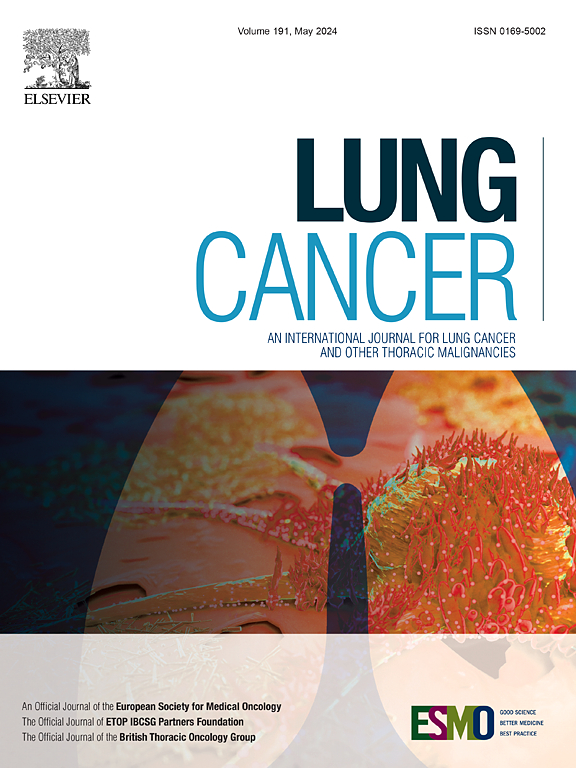An international and multidisciplinary EORTC survey on resectability of stage III non-small cell lung cancer
IF 4.4
2区 医学
Q1 ONCOLOGY
引用次数: 0
Abstract
Introduction
The EORTC-Lung Cancer Group initiated a Delphi consensus process to establish a consensual definition of resectable stage III non-small cell lung cancer (NSCLC) for the use in clinical trials, including a systematic review, survey, and review of clinical cases. Here, the survey results are presented, aimed to identify areas of controversy.
Methods
A survey was distributed among the members of six international organizations related to lung cancer. Respondents were interrogated on the resectability (not limited to the technical resectability) of all stage III NSCLC TNM-subsets (8th edition). Additionally, four N2-subdivisions were used. The threshold for agreement was 75%. Answers with “yes” were considered upfront resectable. “Yes” and “maybe” were grouped together and considered potentially resectable. Answers with “no” were considered unresectable.
Results
558 responses were collected from thoracic surgeons (38%), radiation oncologists (27%), medical oncologists (17%), pulmonologists (14%), and others (4%). Most worked in a specialized center (80%), had >5 years of experience (80%), were European (76%), male (73%), and treated >20 patients with stage III NSCLC annually (77%). Agreement was found in 26 (70%) out of 37 TNM-subsets: 9 (24%) were considered (potentially) resectable, and 17 (46%) unresectable. There was no agreement for 11 (30%) TNM-subsets: smaller tumors with N2-multistation, larger tumors with N2-single station, and invasive T4-tumors with maximum N2-single station involvement.
Conclusions
This international and multidisciplinary survey showed agreement on the resectability for the majority of stage III NSCLC TNM-subsets, but also identified several TNM-subsets for which no agreement was found.
一项关于III期非小细胞肺癌可切除性的国际多学科EORTC调查。
eortc -肺癌小组发起了德尔福共识过程,以建立可切除的III期非小细胞肺癌(NSCLC)的共识定义,用于临床试验,包括系统回顾、调查和临床病例回顾。在这里,调查结果提出,旨在确定争议的领域。方法:对六个与肺癌有关的国际组织的成员进行调查。受访者被询问了所有III期NSCLC tnm亚群的可切除性(不限于技术可切除性)(第8版)。此外,还使用了4个n2细分。达成一致的门槛是75%。回答“是”被认为是可以预先切除的。“是”和“可能”被组合在一起,被认为是可能切除的。回答“否”被认为是不可切除的。结果:558份回复来自胸外科医生(38%)、放射肿瘤学家(27%)、内科肿瘤学家(17%)、肺科医生(14%)和其他(4%)。大多数在专业中心工作(80%),有50年的经验(80%),是欧洲人(76%),男性(73%),每年治疗>20例III期NSCLC患者(77%)。37个tnm亚群中有26个(70%)符合:9个(24%)被认为(潜在)可切除,17个(46%)不可切除。11个(30%)tnm亚型:较小的肿瘤伴n2多站,较大的肿瘤伴n2单站,侵袭性t4肿瘤伴最大的n2单站。结论:这项国际和多学科调查显示,大多数III期NSCLC tnm亚群的可切除性是一致的,但也确定了一些tnm亚群,没有发现一致性。
本文章由计算机程序翻译,如有差异,请以英文原文为准。
求助全文
约1分钟内获得全文
求助全文
来源期刊

Lung Cancer
医学-呼吸系统
CiteScore
9.40
自引率
3.80%
发文量
407
审稿时长
25 days
期刊介绍:
Lung Cancer is an international publication covering the clinical, translational and basic science of malignancies of the lung and chest region.Original research articles, early reports, review articles, editorials and correspondence covering the prevention, epidemiology and etiology, basic biology, pathology, clinical assessment, surgery, chemotherapy, radiotherapy, combined treatment modalities, other treatment modalities and outcomes of lung cancer are welcome.
 求助内容:
求助内容: 应助结果提醒方式:
应助结果提醒方式:


